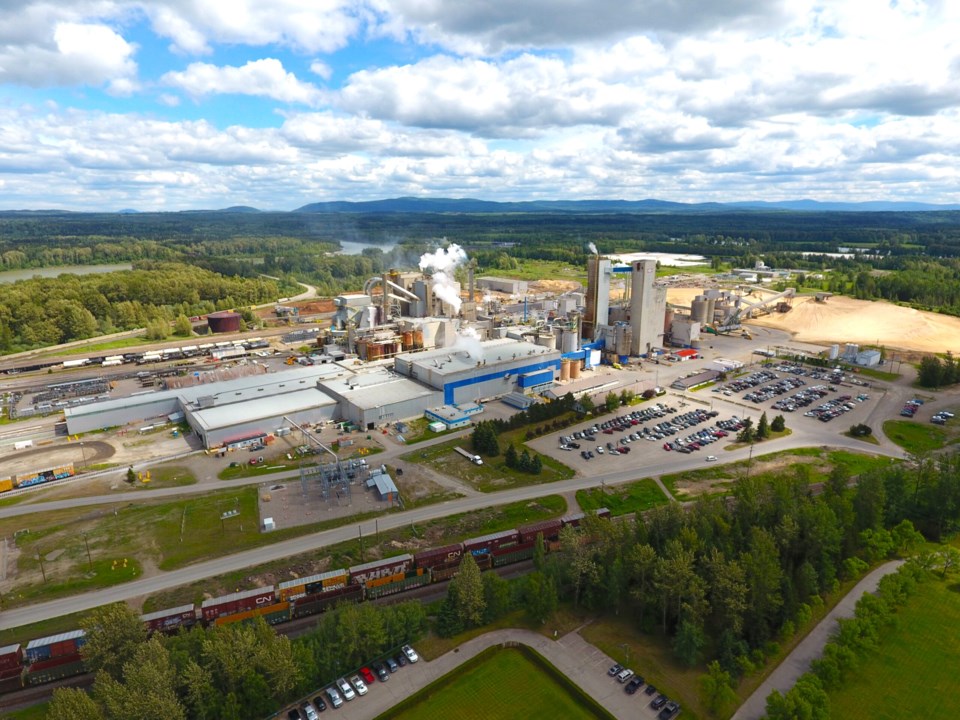Like most forestry workers who have seen the decline of B.C.’s once-thriving pulp-producing industry, Jonathan Blacker was not surprised when he got the news Thursday afternoon that the company he works for, Canfor Pulp Products Inc., plans to curtail one of its two pulp lines at Northwood Pulp Mill.
The indefinite curtailment means as many 220 Northwood workers are about to lose their jobs and Blacker, president of Unifor Local 603 that represents the 361 active members who work at Northwood, feels their pain.
The 51-year-old machinist has worked at Northwood for 12 years and he’s hoping he has enough seniority to keep his job, but he’s not sure. That cloud of uncertainty will hang over the mill for the next few months until the job cuts take effect this summer.
“It’s ugly, it’s a pretty big hit for Prince George,” said Blacker. “It’s pretty bad, I’m concerned about the workforce and all the employees who are going to lose their jobs.”
Blacker said Northwood absorbed some of the job losses when Canfor shut down its Prince George Pulp and Paper pulp line in April 2023 and several workers who were closer to retirement age took buyouts to keep younger employees at the lower rung of the seniority ladder from losing their jobs. Now they face the reality once again they could be heading for the unemployment line.
“The average age is probably 25-40 now,” said Blacker. “Lots of the older people that started at the pulp mill are retired now, they took buyouts when PG (Pulp) was closing so I don’t know if the government is going to step in again to help these workers.”
Blacker says management jobs will also be lost, but he doesn’t know how many.
“They’re worried too, it’s going to affect everybody when you lose half a mill,” said Blacker. “You’ve got couriers, foresters, loggers, truckers, the first-line guys. I’m sure Canfor is looking at saving jobs and where they can amalgamate people and absorb them, be it at a sawmill out of town or whatever, then Prince George loses again because all that money’s gone.”
Combined with Canfor’s other announcements on Thursday that it will permanently close the Polar Sawmill at Bear Lake and that it‘s suspending its reinvestment in its sawmill in Houston, hundreds of direct jobs will be lost as well as hundreds of indirect jobs from support industries.
Blacker points the blame directly at the provincial government and its permitting process which he says creates too many barriers for harvesting companies which he says are shying away from investing in the province’s forest industry. Harvesting has declined sharply and in 2023 the actual cut was 43 per cent lower than the annual allowable cut set by the province.
“Just the state of the industry itself and how hard it is to get fibre now through caribou habitat and Indigenous rights, it’s a tough go,” said Blacker. “Stumpage fees are way up. We’re exporting raw logs. There's companies chipping whole logs (to support the wood pellet export industry), that’s not right.
“It’s hard to get cutting permits, it takes a year or two, whereas other places in the world it’s like a week or two and you can harvest wood. You have to go further out to get the wood. They cut too much wood too fast.”
He says forestry is looked upon as a dying industry by young workers and skilled trades people, which compounds the problems foresters are facing.
Blacker attended the BC Forest Workers Summit in Victoria in March and two weeks later he said Unifor executives met with the provincial government officials to try to get them to reshape their forestry policies to save jobs. He says they’ve known the industry has been dying and have been too slow to react.
“They’ve seen this coming for years,” said Blacker.
“The bottom line is they’ve managed our plantation horribly. They let the harvesters manage the plantation and of course they’re going to cut. There’s wood, there’s lots of trees left, but it’s just harder to get now and more hoops to jump through to get it.
“Canfor’s getting ready to leave, it’s too hard to make money here now. They’ve harvested what they needed and got all the easy wood. They want out, these big harvesters have made their cash and it will be the smaller guys left, I think.”
Blacker says union management will be coming to the mill next week to discuss the future of the affected workers and he hopes to have more answers for workers when he returns from his holidays on May 20.
“Everybody’s got truck payments, house payments, mortgage rates and interest rates through the roof, Blacker said. “Maybe we’ve got to leave British Columbia and go to Edmonton. You’ve got to chase work, you’ve got bills to pay. I’ve been there 12 years and I might just make the cut, but it’s hard to say and I don’t know.
“It’s no good, the government better step in and do something.”



